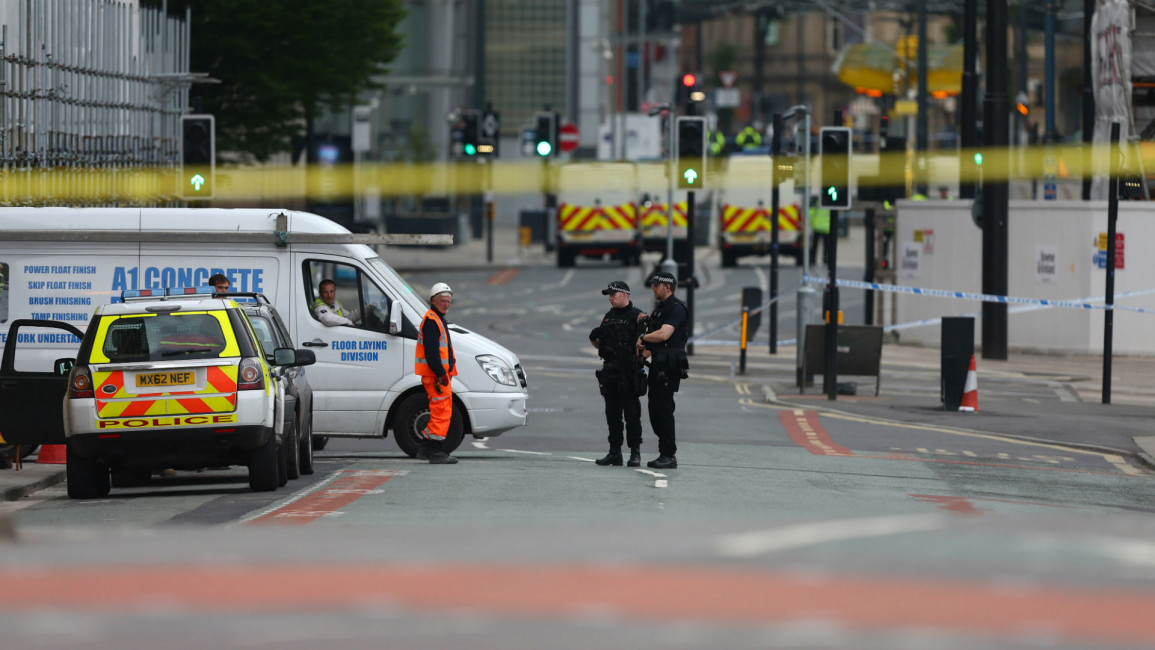Islamic State group claim deadly Manchester suicide attack
The Islamic State group claimed responsibility for an attack that left at least 22 people dead when a suicide bomber detonated an explosive device at a pop concert in the northern British city of Manchester late on Monday, in what is described as the deadliest attack in the country since 2005.
In a statement carried by the militant-linked news agency Amaq, the Islamic State said "a soldier from the caliphate managed to place an explosive device among a gathering of Crusaders in the British city of Manchester, where an explosion at an arena killed some 30 crusaders and inured 70 others," using a derogatory jihadi term for Westerners and Christians, despite the fact that all casualties were civilians including children.
"What is coming is to the crusaders is more severe," the statement warned, just days after a new IS video threatening attacks in several locations across the US and UK was published by the group online.
Twitter Post
|
Police confirmed children as young as eight were among those killed and said dozens more were injured. The local ambulance service said on Twitter it had taken 59 casualties from the incident and treated "a number of walking wounded on scene".
One witness, Elena Semino, told the Guardian newspaper she was with her husband waiting for her daughter by the arena's ticket office when the explosion went off.
"There was this heat on my neck and when I looked up there were bodies everywhere," she said.
Gary Walker told BBC Radio 5 Live he was hit by shrapnel in his foot and his wife sustained a stomach wound as they waited for their daughters to come out of the concert.
"We heard the last song go and then suddenly there was a massive flash and then a bang and smoke," he said.
Police were called at 10:33pm (2133 GMT) to reports of an explosion at Manchester Arena during a concert by pop star Ariana Grande - a singer who is popular with teenagers and pre-teens.
According to police, the blast occurred "within the foyer area of the stadium." Manchester Arena said the blast took place "outside the venue in a public space."
The arena foyer connects the 21,000-capacity auditorium with Victoria train and tram station, a major transport hub on the northern edge of the city centre.
Witnesses described a "huge bomb-like bang" and scenes of panic as young fans rushed out and parents waiting outside frantically searched for their children.
Greater Manchester Police's chief constable Ian Hopkins said a sole attacker had set off an "improvised explosive device" and died in the process.
 |
The bombing is the latest in a string of attacks that have hit Europe in recent years, several claimed by the Islamic State group. |  |
Authorities are treating the attack as a "terrorist incident," but no one has so far claimed it.
Police said they are now investigating whether it was a lone wolf-style attack or whether there are accomplices.
British Prime Minister Theresa May condemned it as "an appalling terrorist attack".
Hopkins said local police in the city were working with national counter-terrorism and intelligence officials on the investigation.
The bombing is the latest in a string of attacks that have hit Europe in recent years, several claimed by the Islamic State group.
The incident in Manchester is the second terror attack to hit Britain in less than two months.
On March 22, five people were killed and more than 50 injured when a man drove into pedestrians on Westminster Bridge in central London, before crashing into the fence surrounding parliament.
The attacker, 52-year-old Muslim convert Khalid Masood, was then shot dead by police at the scene after knifing a police officer to death.
Investigators described the lone-wolf attack as "Islamist related terrorism" but have not charged anyone in connection with the incident.
The deadliest bomb attack on British soil took place on July 7, 2005 when four British suicide bombers inspired by Al-Qaeda attack London's transport system, killing 52 and wounding 700.



